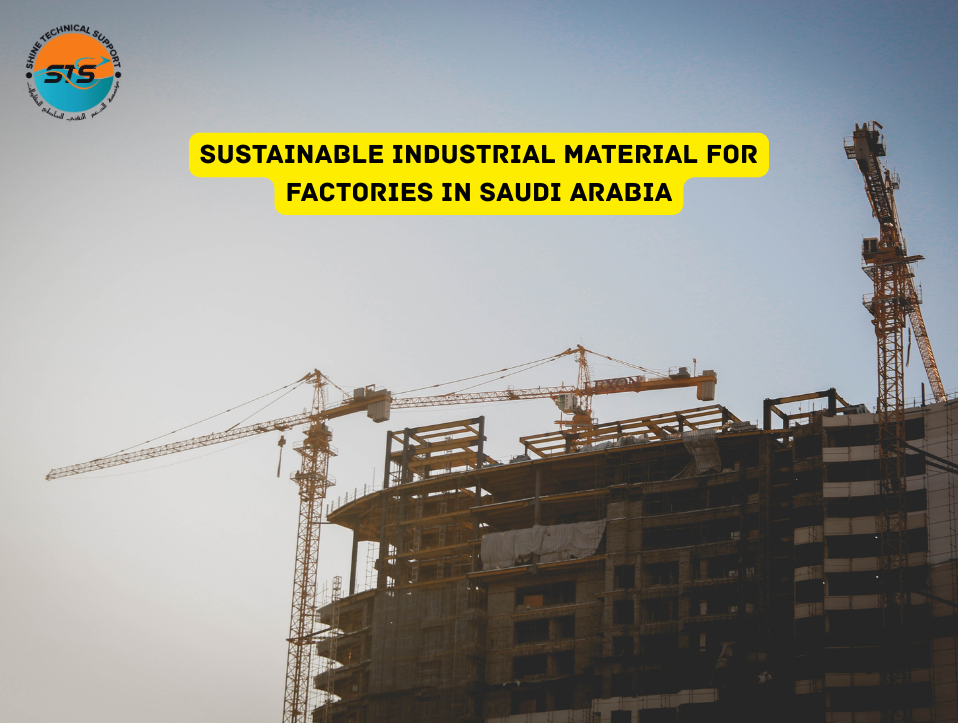In recent years, sustainability has become more than just a buzzword; it has transformed into a crucial strategy for industrial growth worldwide.
For factories in Saudi Arabia, adopting sustainable industrial materials is not only an environmentally responsible choice but also a business-critical decision that improves efficiency, reduces costs, and enhances brand reputation.
At STS GCC, we are committed to supplying high-quality industrial materials that help factories achieve their sustainability goals while maintaining optimal performance. In this blog, we explore sustainable industrial materials, their benefits, challenges, and practical applications in Saudi Arabian factories.
What Are Sustainable Industrial Materials?
Sustainable industrial materials are those that are designed, sourced, and utilized in a way that minimizes environmental impact while maintaining high performance for industrial applications. These materials often focus on:
- Recyclability: Materials that can be reused or repurposed at the end of their lifecycle.
- Reduced Carbon Footprint: Manufacturing processes that emit less CO₂.
- Durability: Long-lasting materials reduce waste and the need for frequent replacement.
- Resource Efficiency: Use of renewable or responsibly sourced raw materials.
Examples include recycled steel, eco-friendly alloys, sustainable plastics, and advanced composite materials. These materials not only benefit the environment but also increase operational efficiency, making them ideal for Saudi Arabia’s growing industrial sector.
Importance of Sustainable Materials for Saudi Factories
Sustainability in industrial manufacturing is no longer optional. Here’s why factories in Saudi Arabia should prioritize sustainable materials:
a) Environmental Responsibility
Saudi Arabia has committed to reducing environmental impact through initiatives like Saudi Green Initiative. Using sustainable materials helps factories reduce waste, lower emissions, and contribute to national sustainability goals.
b) Cost Efficiency
Durable and recyclable materials reduce the need for frequent replacements. For example, recycled steel maintains the same structural integrity as new steel while reducing raw material costs. Over time, sustainable materials help cut operational and maintenance expenses.
c) Regulatory Compliance
The Saudi government is encouraging eco-friendly industrial practices. Factories adopting sustainable materials can comply with regulations more easily, avoiding fines and penalties while enhancing their public image.
d) Improved Brand Image
Investors and clients increasingly prefer companies that follow sustainable practices. By integrating sustainable industrial materials, factories in Saudi Arabia can build trust and strengthen their market position.
Types of Sustainable Industrial Materials
Factories can adopt several types of sustainable materials depending on their manufacturing processes.
a) Recycled Steel
Steel is one of the most commonly used materials in factories. Recycled steel uses scrap metal to produce high-quality steel products with reduced energy consumption and lower carbon emissions. Benefits include:
- Reduced extraction of natural resources
- Lower energy usage during production
- Cost-effective for structural applications
b) Sustainable Alloys
Advanced alloys made from responsibly sourced metals help factories achieve high durability and corrosion resistance while being environmentally friendly. For example, stainless steel alloys can last decades, reducing material wastage.
c) Eco-Friendly Plastics
Industrial plastics made from bio-based or recycled sources are increasingly replacing traditional petroleum-based plastics. These plastics are ideal for packaging, insulation, and protective components while reducing plastic waste in landfills.
d) Composite Materials
Fiber-reinforced composites and carbon fiber materials are strong, lightweight, and durable. They reduce energy consumption in transport and production, making them a sustainable choice for modern factories.
e) Renewable Materials
Materials like bamboo-based composites, sustainable wood panels, and natural fibers are used in factory interiors, packaging, and support structures. Renewable materials provide a low-carbon alternative to conventional resources.
Benefits of Using Sustainable Materials in Factories
Adopting sustainable materials offers multiple benefits beyond environmental protection.
a) Energy Efficiency
Many sustainable materials require less energy to produce and maintain, reducing overall industrial energy consumption. For example, recycled steel production consumes up to 60% less energy than producing new steel from raw iron.
b) Reduced Waste
Sustainable materials are designed for reuse and recyclability, minimizing industrial waste. Factories can adopt circular economy practices where materials are repurposed rather than discarded.
c) Enhanced Product Life
Durable materials mean longer lifespan for machinery, components, and structures, reducing the frequency of replacements and maintenance.
d) Health & Safety
Eco-friendly materials often have lower toxicity levels and fewer harmful emissions, ensuring a safer workplace for employees.
e) Competitive Advantage
Factories using sustainable materials are seen as innovators, attracting clients and investors who value sustainability, leading to business growth and stronger market presence.
Challenges in Adopting Sustainable Materials
While the benefits are clear, factories may face challenges in adopting sustainable materials:
a) Higher Initial Costs
Sustainable materials can sometimes be more expensive upfront, although they save costs in the long term due to durability and reduced energy consumption.
b) Supplier Availability
Not all suppliers provide certified eco-friendly materials. Partnering with trusted suppliers like STS GCC ensures quality and authenticity.
c) Knowledge Gap
Factories may lack technical knowledge about sustainable materials and their properties. Training staff and consulting experts can help in effective implementation.
d) Compatibility
Some sustainable materials may not be suitable for all machinery or industrial processes. Careful material selection and testing are necessary to ensure seamless integration.
How STS GCC Supports Sustainable Industrial Practices
At STS GCC, we specialize in providing high-quality, sustainable industrial materials for factories in Saudi Arabia. Here’s how we help:
a) Certified Sustainable Materials
We supply ISO-certified, eco-friendly steel, alloys, and plastics, ensuring factories get reliable, durable, and sustainable products.
b) Bulk Supply & Custom Solutions
Whether a factory needs large-scale bulk materials or custom specifications, we provide flexible solutions tailored to operational and environmental requirements.
c) Technical Guidance
Our experts assist factories in selecting the right materials, considering factors like durability, energy efficiency, and recyclability.
d) Local Delivery & Support
With operations in Jubail and throughout Saudi Arabia, STS GCC ensures timely delivery, installation support, and ongoing technical assistance.
Steps for Factories to Transition to Sustainable Materials
Adopting sustainable materials requires a structured approach:
- Assess Current Material Usage: Identify materials with high environmental impact.
- Set Sustainability Goals: Define targets like waste reduction, energy efficiency, or recyclability.
- Consult Experts & Suppliers: Partner with trusted suppliers like STS GCC to select certified sustainable materials.
- Test & Implement: Pilot sustainable materials in select processes before full-scale adoption.
- Monitor & Optimize: Track savings, efficiency improvements, and environmental impact to refine material strategies.
Conclusion: Why Sustainability Matters for Factories in Saudi Arabia
Sustainable industrial materials are no longer optional they are a strategic necessity for factories in Saudi Arabia. By using recycled steel, eco-friendly alloys, composites, and renewable materials, factories can reduce costs, improve efficiency, and enhance their brand reputation.
At STS GCC, we are proud to supply certified, high-quality sustainable industrial materials that empower factories to achieve long-term growth and environmental responsibility. Transitioning to sustainable materials is not just good for the planet it’s good business.







